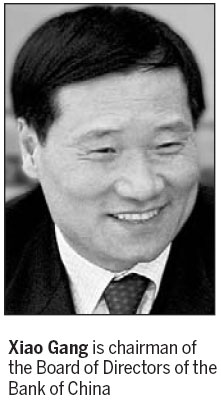Save euro, save globalization
Updated: 2011-02-11 07:40
By Xiao Gang (China Daily)
Integrated community, currency and cross-border free trade need strong political leadership and coordination to revive
In the wake of Europe's woes, more and more voices from European countries and beyond have been calling for the euro to be abandoned. Surveys in France show that more than 35 percent of the respondents desire the reintroduction of the French franc, and in Germany there are strong voices calling for the return of the Deutschmark.
From historic, economic, political and
|
|
To some extent, saving the euro is akin to saving globalization. The creation of the euro can be seen as one of globalization's greatest achievements over the past decades.
The process of European integration began with the establishment of the European Coal and Steel Community in 1951, and the signing of two treaties in Rome on March 25, 1957 by Belgium, France, Italy, Luxembourg, the Netherlands, and West Germany. The treaties established the European Atomic Energy Community and the European Economic Community.
The Merger Treaty signed in Brussels, Belgium, on April 8, 1965 combined the executive bodies of the European Coal and Steel Community, European Atomic Energy Community and the European Economic Community into a single institutional structure.
With its members growing and its geographical scope broadening, the European Union had 15 member countries by 1997.
Seven years later, the EU reached a new milestone when it formally admitted 10 new members. This move added 75 million people, created the world's largest free-trade bloc and ended the continent's division.
The initiative to build Europe's monetary union emerged in 1970, but it wasn't until 1992, when the Maastricht Treaty was signed, that the roadmap and timetable for creating a single currency were determined.
The euro has been largely successful in many areas over the past 12 years since its debut. The EU is a great example of an integrated security community with a single economy. It has drawn on historic lessons and ended the wars among European countries. Moreover, the single currency is dedicated to liberal democratic governance and a cross-border free market.
With economic and financial integration, the trade volume within the euro-area countries has surpassed 1 trillion ($1.37 trillion) a year, showing the huge development potential of the common market. At the same time, the European countries have benefited significantly in the absence of foreign exchange rate fluctuations and the colossal reductions in transaction costs, and the euro has boosted a freer flow of talent, funds, technologies and other resources. Under these conditions economic development and employment has been promoted across the eurozone.
The euro has also brought price stability. The European Central Bank clearly defined an annual inflationary target in the euro area below 2 percent in the medium term.
For the past 12 years, the average annual inflationary rate has been 1.97 percent. As a result, millions of European citizens have seen their purchasing power and the value of their savings preserved.
E-paper

Ear We Go
China and the world set to embrace the merciful, peaceful year of rabbit
Preview of the coming issue
Carrefour finds the going tough in China
Maid to Order
Specials

Mysteries written in blood
Historical records and Caucasian features of locals suggest link with Roman Empire.

Winning Charm
Coastal Yantai banks on little things that matter to grow

New rules to hit property market
The State Council launched a new round of measures to rein in property prices.

